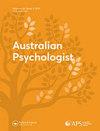Cultural interventions that target mental health and wellbeing for First Nations Australians: a systematic review
IF 2
4区 心理学
Q2 PSYCHOLOGY, MULTIDISCIPLINARY
引用次数: 0
Abstract
ABSTRACT Objective The continuity of Australian First Nations (Aboriginal and Torres Strait Islander) culture has been threatened by colonisation and effects of this continue to have devastating impacts on their social emotional wellbeing [SEWB], especially mental health. This review analyses cultural interventions aiming to improve mental health outcomes for First Nations Australians (e.g., mood, self-esteem, suicide-attempts, self-harm, risky behaviours) to uncover the effectiveness and key components of such interventions. Method Databases PsycINFO, CINAHL, EMBASE, EMCARE, LIt.search tool from Lowitja Inst, Australian Indigenous Health InfoNet and Google Scholar were searched. Studies published between 2000 and 2021 which reported the impact of cultural interventions on the mental health of First Nations Australians were included. Results From 172 studies, only eight studies met inclusion criteria and all improved measured domains of SEWB. Six studies evaluated culturally adapted interventions (i.e., Western interventions adapted to be culturally appropriate) and two evaluated culturally grounded interventions (i.e., interventions developed by First Nations Australians). Participants called for more cultural components in culturally adapted interventions. The most successful studies used collaborative and participatory approaches in the designs, included First Nations members in their research teams and presented culturally grounded interventions. Conclusions The paucity of literature limit findings. There was a limited ability to identify key mechanisms of change across some intervention studies, and large outcome variations across studies meant some aspects could not be compared. Nonetheless, this review concludes that culturally grounded interventions are the most promising and successful mental health interventions currently available for First Nations Australians which has many implications for practice and funding. Key Points What is already known about this topic: First Nations Australians experience poorer mental health and wellbeing than non-indigenous Australians. Previous attempts to improve the mental health of First Nations Australians utilising Western therapeutic interventions have been largely unsuccessful. More recent attempts to improve mental health for First Nations Australians utilising culture appear promising, that is, culturally adapted and culturally grounded therapeutic interventions. What this paper adds: (1) Culturally grounded interventions are effective, preferable over culturally adapted interventions, and best to use for improving the mental health and wellbeing of First Nations Australians. (2) Limited evaluations of cultural interventions have been conducted that provide empirical data showing the effectiveness of the intervention on mental health and wellbeing for First Nations Australians. (3) Successful forms of intervention evaluations with First Nations Australians utilise participatory and collaborative research approaches.针对澳大利亚原住民心理健康和福祉的文化干预:一项系统综述
摘要目的澳大利亚原住民(原住民和托雷斯海峡岛民)文化的延续性受到殖民主义的威胁,殖民主义的影响继续对他们的社会情感健康,特别是心理健康产生毁灭性影响。本综述分析了旨在改善原住民澳大利亚人心理健康结果的文化干预措施(如情绪、自尊、自杀企图、自残、危险行为),以揭示此类干预措施的有效性和关键组成部分。方法检索Lowitja Inst、Australian Native Health InfoNet和Google Scholar的数据库PsycINFO、CINAHL、EMBASE、EMCARE、LIt.搜索工具。2000年至2021年间发表的研究报告了文化干预对澳大利亚原住民心理健康的影响。结果在172项研究中,只有8项研究符合纳入标准,所有研究都改善了SEWB的测量域。六项研究评估了适应文化的干预措施(即适应文化的西方干预措施),两项研究评价了基于文化的干预行动(即澳大利亚原住民制定的干预措施)。与会者呼吁在适应文化的干预措施中增加文化成分。最成功的研究在设计中采用了合作和参与的方法,将原住民成员纳入其研究团队,并提出了基于文化的干预措施。结论文献的缺乏限制了研究结果。在一些干预研究中,识别关键变化机制的能力有限,研究之间的结果差异很大,这意味着某些方面无法进行比较。尽管如此,本次审查得出的结论是,基于文化的干预措施是目前澳大利亚原住民最有希望和最成功的心理健康干预措施,这对实践和资金有许多影响。要点关于这个话题已经知道的是:第一民族澳大利亚人的心理健康和幸福感比非土著澳大利亚人差。此前,利用西方治疗干预措施改善澳大利亚原住民心理健康的尝试基本上没有成功。最近,利用文化改善澳大利亚原住民心理健康的尝试似乎很有希望,即适应文化和基于文化的治疗干预措施。本文补充道:(1)基于文化的干预措施是有效的,比适应文化的干预更可取,最适合用于改善澳大利亚原住民的心理健康和福祉。(2) 对文化干预措施进行了有限的评估,这些评估提供了实证数据,显示了干预措施对澳大利亚原住民心理健康和幸福感的有效性。(3) 与澳大利亚原住民的成功干预评估采用了参与式和协作式的研究方法。
本文章由计算机程序翻译,如有差异,请以英文原文为准。
求助全文
约1分钟内获得全文
求助全文
来源期刊

Australian Psychologist
PSYCHOLOGY, MULTIDISCIPLINARY-
CiteScore
3.70
自引率
5.30%
发文量
32
期刊介绍:
The Australian Psychologist is the official applied practice and public policy journal of the Australian Psychological Society. As such, the journal solicits articles covering current issues in psychology, the science and practice of psychology, and psychology"s contribution to public policy, with particular emphasis on the Australian context. Periodically, Australian Psychological Society documents, including but not limited to, position papers, reports of the Society, ethics information, surveys of the membership, announcements, and selected award addresses may appear in the journal.
 求助内容:
求助内容: 应助结果提醒方式:
应助结果提醒方式:


